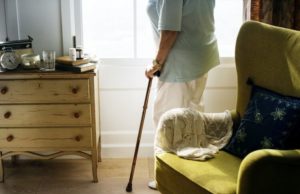 By Debbie Reslock
By Debbie Reslock
Do you lie awake at night in a cold sweat, worried about your dad living alone? What if he falls and can’t get to a phone to call for help? But he maintains he’s fine.
When the goals of safety and longevity clash with those of autonomy and independence, you’ll find the basis of most conflicts between older adults and their children, according to Dr. Leslie Kernisan, a geriatrician practicing in San Francisco.
It’s easy to appreciate both viewpoints. But disputes like these can fracture families. Older adults see visions of a life ending in disappointment and less meaning. Their children see them lying on the bathroom floor or being duped out of their savings.
The Rights of Older Parents Are Clear
These are not elders whose capacity no longer allows them to understand a decision or its consequences. Or children who don’t care. This is what happens with good intentions from both sides.
The problem is where a road lined with those intentions can lead, says Barbara Cashman, a Denver attorney specializing in elder and estate law. It is often a place where older adults are treated as incapable and their children sink under the weight of responsibility for people who refuse to listen.
But if there’s no lack of capacity, the adult has the right to make his or her own decisions, even bad ones, Cashman says. “Even if I decide to give my money away, a judge could say that it’s my money and my choice what to do with it.”
Kernisan agrees. “If there aren’t signs of cognitive issues and there haven’t been any red flags, the older person has the right to make their own decisions — even if they make others uncomfortable,” she says.
Ageism Plays a Role
Why do we see the world from such different perspectives?
Ageism, the stereotyping of a group of people based solely on their age, plays a big role. Most of us have an unfair preconceived view of what it means to be old. So we often assume an older parent is at risk for being taken advantage of or should no longer live alone.
“We don’t value aging,” says Penny Cook, president/CEO of Pioneer Network, an organization supporting changing attitudes toward aging and elders. “Our negative perception helps marginalize older adults. They become ‘less than’ because that helps us cope and then we take on the parental model.”
In the blog, Time Goes By, a reader recently commented about an 80+ friend who wasn’t allowed to sign a contract with a company to do work for her because their policy was that a younger family member needed to be present. This was based solely on a predetermination of an age, not whether the company believed the woman understood what she was signing.
But there is support from the law.
“A neighbor can call Adult Protective Services and say they just saw you on your roof or fall off your front steps,” Cashman says. “They may send a caseworker out, but if they find no evidence of self-neglect and there’s food and heat, you still have the right to stay in your house.”
Don’t Make it a Lose-Lose Situation
This situation is admittedly complicated for grown kids. Cook says one of the hardest things to feel is helpless. “It’s such a difficult place to be in if you can’t help. I have a lot of empathy for kids that are trying to do what’s best,” she says.
But fear and anxiety may unknowingly force parents into keeping secrets because of what a conversation may trigger. Cook talked to someone in her 80s who’d been taken advantage of financially. Even though it was a situation that could have happened to someone at any age, she felt she had to keep it to herself.
Other times, children don’t understand what’s really happening. Says Cashman: “They may think a neighbor is taking advantage of their mom for free day care, but what they don’t see is that she’s really enjoying feeling useful again.”
Parents may be unsure, too, and potentially, scared.
Instead of drawing a line in the sand, look for a compromise, like a housekeeping service, public transportation, meal delivery or home care a couple of days a week if it becomes needed.
Sometimes, adult kids may not realize how important it is to their parents to continue living in their own homes. Meeting with a card group at their church in Tinley Park, Ill., Teresa Hughes, 75, asked her friends about their decisions to stay in their own homes. Overwhelmingly, the group, ages 75 to 94, didn’t want to leave the homes they loved or their neighborhoods.
Some admitted to loneliness, yet felt moving to a working child’s home could be just as lonely until the son or daughter came home at night.
5 Suggestions for Bridging the Gap
Here are five suggestions for grown children and their parents to find middle ground:
- Learn the Pioneer Network principles to shift assumptions about aging. They include being entitled to self-determination and recognizing that risk-taking is a normal part of life.
- Talk to each other. Share this article with your parents as a starting point. Recognize if you’re making things more difficult. Work for a solution so you don’t sacrifice your time together.
- Address what’s happening. Be honest, Kernisan says, and share your concerns.
- Ask how to help your parent keep his or her quality of life. Listen from the heart. And if there’s a crisis, try not to make decisions then.
- Be prepared for a bumpy road. Logical arguments often fail to convince people with whom we have emotional relationships, says Kernisan, since we’re not always rational about issues that stir up certain emotions, like our identity, self-worth and autonomy.
© Next Avenue – 2018. All rights reserved.






Leave a Reply